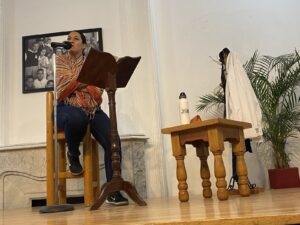After conducting 100 interviews with journalists from all over the world about their mental health and emotional well-being related to the profession, Mexican journalist Luisa Ortiz said in an interview with LatAm Journalism Review (LJR) that journalism is “a long-suffering profession and entails many collateral damages, [journalists] are leaving pieces of their health along the way.”
She said that “the cost of being a journalist is very high on mental, emotional, familial and physical levels.” She defined journalists as “passionate people, addicted to adrenaline, very committed and even kamikazes, who carry out a labor of love.”
Through a JSK Journalism Fellowship at Stanford University that she completed between September 2022 and June 2023, Ortiz developed the Human Condition Journalism Project.

Luisa Ortiz presenting Human Condition at the Citlaltépetl Shelter House, in Mexico City. (Courtesy: Luisa Ortiz)
This is a play about journalism written, directed and acted out by Ortiz. Her goal is to “open the conversation about what makes journalists happy, what hurts them and, above all, what they need help with as professionals,” she explained. Likewise, she seeks to “generate empathy and understanding among people who want to cultivate a longer, healthier and more lasting relationship with journalism.”
The staging is a series of monologues that Ortiz has presented in California, Buenos Aires and Mexico City, and that she will take to Berlin in April. There she tells the stories of the journalists, how they relate to their work and what wounds they have to deal with.
The wounds that Ortiz identified in journalists in terms of mental health and emotional well-being, and which appear in the monologues, are anxiety, depression, alienation or not feeling anything.
Regarding the physical wounds that journalism leaves in those who practice it, she said that in conversations with journalists, they had “back, neck, and wrist problems; many gastroenterological problems; prostate and uterine problems; diabetes and hypertension.”
Furthermore, Ortiz acknowledged that these health problems are rarely discussed among colleagues and that “the body is one of the work tools that journalists treat very badly.” And she added: “If they were construction workers, they would put on gloves and a helmet, but in journalism there is very little attention and care for the body.”
Another of the wounds that Ortiz identified has to do with the “shared trauma” of being a journalist, which is why she said: “The journalist constantly smells coal, he puts out fires, he is like a firefighter, that makes him a good journalist.” She also highlighted the “relational issue,” that is, “the harm that journalists do to each other in the newsrooms, the bullying, the mistreatment, the bad vibes and the brutal context in which journalism lives today.”
In the shoes of 100 journalists
It took Ortiz three months to define the basic question for the 100 interviews she conducted with journalists from around the world: “How does it feel to walk in your shoes?”
“That question implies movement, agency, action, it desubjectifies the journalist who hates talking about themself, and allows them to make a deep reflection about themself,” she said.
Ortiz, 52, considers herself a “multifaceted professional.” She has been director and editorial manager of digital media, has a PhD in political philosophy, and has founded three organizations. One of them is Vita Activa, a helpline for women and LGBTIQ+ people, journalists, activists and defenders of gender, work, land and freedom of expression rights.

Luisa Ortiz presenting Human Condition at the Citlaltépetl Shelter House, in Mexico City. (Courtesy: Luisa Ortiz)
She said the play Human Condition was based on The Vagina Monologues by V Ensler (formerly Eve), who asks hundreds of women what their relationship is with their vagina. Ortiz does the same with journalists, asking them about their relationship with journalism.
Each monologue, according to Ortiz, has a main theme or “wound” that afflicts the interviewed journalists. The first is about depression, the second is about not belonging, the third is about alienation (or feeling nothing), the fourth is about anxiety, the fifth is about death, and the sixth is about beginning and doubt.
To fuel the monologues, she developed two more questions that she asked the journalists she interviewed: What prevents you from doing your job well? And what is the wound that journalism has caused you and where is it on your body?
“I am very fond of journalism, it seems to me that it is the only thing that has never failed me in life,” Ortiz said in one of her monologues. In an interview with LJR, she considered that “journalists love journalism and they love to talk about their work. I have recorded hours of conversations talking and talking about it.”
The common thread of the interviews was that the interviewees practice journalism and, furthermore, that they love what they do.
“I thought this work was about pain, but no, it is about the love that people put into journalism every day. It's a labor of love. Everyone says it in their own way and with their own words,” Ortiz said.
To select the interviewees, she initially started with people close to her. She then created an intersectional map in which she included interviewees from different regions, ages, jobs within the trade and who were open to speaking. Once she spread the word among journalists, they themselves began contacting her to talk. She interviewed journalists who are at the end of their careers, and others who are just beginning it. She did the interviews in virtual format, because, according to her, that distance generated a certain degree of protection for the interviewees.
Each of the monologues belongs to a person, but it is not possible to know who it is in order to protect the identity of the journalists who currently practice the profession, Ortiz said.
“There is a nod to each person, for example, if I wear a white shirt in a monologue it is because that person always wears a white shirt. Each of the people read their piece, edited it, gave their consent and surrendered to the process.”
The play Human Condition was produced by María Zurita Ontiveros. Additionally, playwright Branislav Kakovljevic and choreographer Aleta Hayes, both professors at Stanford, supported the writing and staging process.
The role of the media in the mental health of journalists
“I learned that no media outlet is worth putting at risk emotional stability, emotional well-being or anything like that. As journalists we need restraint,” Ortiz said during one of the monologues.
The responsibility of media is decisive in the health of journalists.
“The work environment in the media is unhealthy,” Nicole Martin, journalist and executive director of Vita Activa, told LJR. “There is a responsibility of the media and those who direct them when it comes to continuing to foster that toxic environment for mental health, where any type of breaks are not considered, extreme competition is promoted and there is an ode to productivity.”
 In 2023, Vita Activa handled 125 cases, providing people with psychological and digital first aid online. Of those, 40% are journalists, 53% are under 30 years old and 91% are women, according to the organization's latest annual report.
In 2023, Vita Activa handled 125 cases, providing people with psychological and digital first aid online. Of those, 40% are journalists, 53% are under 30 years old and 91% are women, according to the organization's latest annual report.
The main reasons why journalists go to Vita Activa is to address the violence and emotional crises they suffer due to the exercise of their profession, according to Martin. When it comes to digital violence, she explained that it involves “online harassment, account hacking, dissemination of intimate images without consent, fake profiles, impersonation and identity theft, unauthorized access or control of information, monitoring and stalking, and attacks to digital security.”
Digital violence has become an obstacle in the careers of female journalists. According to UNESCO and ICFJ data from 2022, 73% of female journalists worldwide have suffered digital violence related to their work. In turn, the International Women's Media Foundation said last year that one in three women has considered leaving their job due to digital harassment.
Regarding the emotional crises for which journalists come to Vita Activa, Martin said that these involve “stress, anxiety, sadness, depression, panic and grief. It can also be due to a loss of emotional control, work problems that cause an emotional crisis, and burnout or exhaustion syndrome.”
For the executive director of the organization, “it would be very important for journalists to have the Vita Activa number programmed in their cell phone because the initial support of psychological first aid is key when you have just suffered the impact of a news story, an accident or have experienced digital violence.”